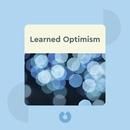Learned Optimism
Learned Optimism: How to Change Your Mind and Your Life
Your highlights:Optimists have a better immune system and are generally healthier.
Also, optimists encounter fewer negative life events than pessimists do, a phenomenon that researchers explain in terms of a pessimist’s passivity due to their conviction that they can't change anything. So if you're a pessimist, encountering an abundance of negative events, your body will have to suffer a lot of stress, which in turn can lead to disease. Thirdly, optimistic people find it easier to sustain friendships, and friendship is beneficial to our health. This is because having a friend that you can confide in and discuss anything and everything with actually eases the stress generated by negative life events.
9 September, 2019 11:07 Share
Optimism is also very useful in your professional life.
An important part of a sales agent's work is cold calling, which typically ends in a lot of refusals. Only those agents who continued to call at least ten leads a day, no matter how many rejections they received, became successful. The others usually quit. In addition to the already extensive selection process, Seligman measured the optimism of prospective sales agents. He proceeded to hire agents that underperformed slightly on the standard industry tests (which measured the applicant's "aptitude" to become a sales agent) but scored very highly in optimism.
9 September, 2019 11:10 Share
You can change your self-talk by using the ABC technique.
Once you have found a few ABCs in your life, you are then in a position to change them. It's crucial to realize at this point that the beliefs you've recorded will largely determine the consequences.
9 September, 2019 11:11 Share
Try to understand the connection between A, B and C, and change where appropriate.
Our beliefs about a situation will determine both its consequences and how we feel about the situation. So, by changing our beliefs, we also change these consequences and our feelings. While it's difficult to ascertain which of our beliefs are "true," it's clear that how we think about negative events greatly influences how they affect us.
9 September, 2019 11:12 Share
About the book:
Learned Optimism explains why so many people grow up to be pessimistic and what the negative implications of this habit are. Furthermore, it shows how our habitual optimism or pessimism influences us for better or for worse in all areas of life. Finally, it shows how pessimists can learn how to become optimists, thus greatly improving their health and happiness, and presents several techniques for learning this new way of thinking.
About the author:
Martin Seligman is a professor of psychology and chairman of the American Psychological Association. He is one of the leading figures in positive psychology, which focuses on developing the positive aspects of the human psyche (in contrast to "traditional psychology," which deals mainly with mental illness). His other bestselling books include The Optimistic Child, Authentic Happiness and Flourish.
Blinkist takes outstanding nonfiction books and distills their key insights into made-for-mobile book summaries that you can read in just 15 minutes. Learn something new every day - on your smartphone, tablet or PC.
blinkist.com